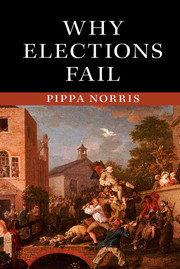Technical Appendix
Published online by Cambridge University Press: 05 August 2015
Summary
To supplement existing sources of evidence, the PEI expert survey, launched by the Electoral Integrity Project, aims to provide a comprehensive, systematic, and consistent way to monitor and compare the quality of elections worldwide. The study draws on evaluations of electoral integrity provided by a range of independent election experts. This appendix summarizes the project and the research design.
The Electoral Integrity Project
The project involves a team of scholars, including research staff, visiting fellows, and postgraduate interns, based at Harvard University's Kennedy School of Government and the University of Sydney, as well as an international Advisory Board and global networks of colleagues meeting at a series of events and workshops. The six-year research project has been generously funded by the award of the Kathleen Fitzpatrick Australian Laureate from the Australian Research Council. Supplementary support for specific events has been provided by several other sponsors, including the Weatherhead Center for International Affairs, the Roy and Lila Ash Center for Democratic Governance and Innovation, and the Australian Studies Committee at Harvard University, as well as International IDEA, Global Integrity, the Sunlight Foundation, the Open Society Institute, and the Hewlett Foundation.
The Concept of Electoral Integrity
The concept of “electoral integrity” in this project refers to international standards and global norms governing the appropriate conduct of elections. These standards have been endorsed in a series of authoritative conventions, treaties, protocols, and guidelines by: agencies of the international community, notably by the decisions of the UN General Assembly; by regional bodies such as the Organization for Security and Cooperation in Europe (OSCE), the Organization of American States (OAS), and the African Union (AU); and by member states of the UN. Following endorsement, these standards apply universally to all countries. The notion of an electoral cycle can be conceptualized as the series of sequential steps illustrated in Figure 1.1. The international community has adopted the electoral cycle approach by recognizing that it is inadequate to parachute observers in to scrutinize only the end processes of balloting, vote count, and results if there is not also a longer-term assessment of each contest.
- Type
- Chapter
- Information
- Why Elections Fail , pp. 179 - 182Publisher: Cambridge University PressPrint publication year: 2015



